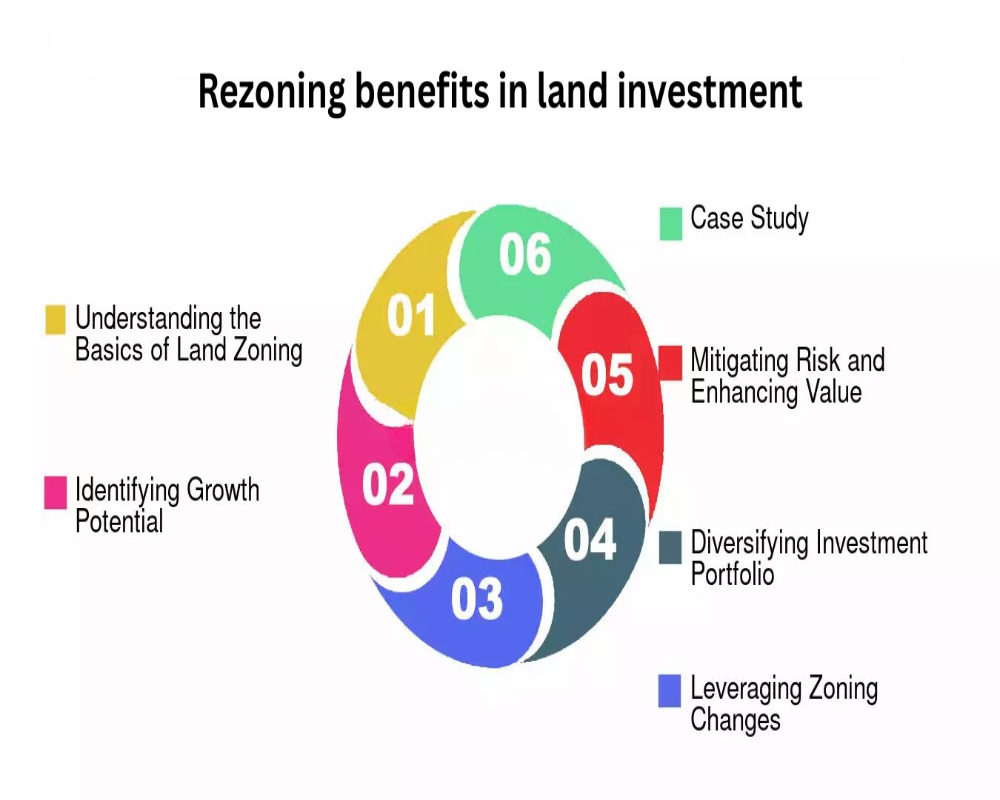Introduction
Rezoning in land investment refers to the process of legally changing a land parcel’s designated use, typically from residential, agricultural, or industrial to commercial or mixed-use. This transition opens the door to new development possibilities and significantly increases the land’s utility and market value. For real estate investors and developers, rezoning is a strategic tool that enhances flexibility, boosts profit margins, and aligns properties with evolving urban trends. By converting raw or underutilized land into high-demand zones, rezoning transforms passive assets into valuable commercial opportunities. The following sections outline the key benefits of rezoning in land investment.
Value Appreciation and Wealth Creation
One of the most significant benefits of rezoning is the increase in land value after the classification is upgraded. Commercially zoned land commands higher prices than residential or agricultural plots due to its income-generating potential. This appreciation creates instant equity for the investor. The value uplift often occurs even before physical development begins, offering strong returns with minimal input.
Broader Development Possibilities
Rezoned land can support a wide variety of commercial projects such as office spaces, retail outlets, warehouses, or hospitality ventures. This flexibility allows investors to respond to market demand and explore multiple monetization models. Development options can also be phased to suit budget, timing, and local economic trends. A single rezoning action opens long-term commercial potential that aligns with urban growth.
Attracting High-Value Buyers and Tenants
Land with commercial zoning appeals to a larger pool of developers, institutional buyers, retailers, and service providers. These stakeholders are more likely to engage in leasing, joint ventures, or outright purchases. Rezoning boosts the marketability of the property, making it easier to close profitable deals. Commercial users also value the legal clarity and development readiness of zoned plots.
Leasing and Revenue Generation
Once land is zoned for commercial use, it can be leased for various purposes such as parking, logistics, food stalls, storage, or display space. Leasing creates a steady stream of passive income while preserving ownership. This is especially beneficial in strategic locations with high footfall or transport access. The potential for interim leasing adds value even before long-term development begins.
Eligibility for Development and Government Incentives
Rezoning often makes land eligible for infrastructure grants, tax benefits, or policy incentives linked to commercial expansion. These benefits can lower construction costs and improve project viability. Governments may offer relaxed compliance norms or fast-track permissions for zoned land. Strategic investors can align their projects with local planning incentives for better financial outcomes.
Enhanced Financing and Mortgage Opportunities
Banks and financial institutions are more inclined to finance projects on commercially zoned land due to higher resale value and business potential. This improves the investor’s ability to raise capital for construction, leasing, or resale. Clear zoning status strengthens the land’s credibility, enabling better loan terms and risk evaluation. Enhanced financing access accelerates development timelines.
Support for Strategic Exit Planning
Rezoning increases the number of exit options available to an investor. They can sell the land at a premium, develop and lease, or partner with commercial builders for joint ventures. The flexibility created through zoning allows investors to choose an exit path that aligns with market timing and financial goals. It improves liquidity and maximizes return on investment.
Alignment with Urban Expansion and Demand Trends
Rezoning allows land to be repositioned in response to changing urban dynamics. As cities expand and commercial demand shifts, rezoning enables alignment with future planning. Investors who track zoning plans and infrastructure projects can position their assets for maximum relevance. It ensures long-term utility of the land in a rapidly evolving environment.
Legal Clarity and Regulatory Compliance
Once rezoned, the land’s use becomes compliant with local regulations and building codes. This minimizes the risk of legal disputes, usage violations, or demolition orders. Clear zoning also speeds up approvals for construction and commercial licensing. Regulatory clarity builds investor confidence and simplifies asset management.
Portfolio Diversification and Risk Management
Rezoned land adds diversity to an investor’s real estate portfolio by introducing assets that offer both capital gains and revenue generation. It balances risk across asset types and geographies. The investor gains access to a more dynamic segment of the market. This diversification strengthens overall portfolio stability and long-term growth potential.
Conclusion
Rezoning brings a host of benefits to land investors, from unlocking immediate value and enabling development to improving financing, leasing, and resale potential. It enhances the land’s economic function, aligns with urban development plans, and opens access to institutional buyers and incentives. With proper planning and regulatory compliance, rezoning is a transformative strategy that turns raw land into a powerful commercial asset, supporting both profitability and growth.
Hashtags
#RezoningBenefits #LandInvestment #RealEstateInvesting #PropertyDevelopment #UrbanPlanning #InvestmentOpportunities #LandUse #RealEstateStrategy #ZoningLaws #PropertyValue #SmartInvesting #RealEstateTrends #LandDevelopment #InvestmentGrowth #CommunityDevelopment #SustainableInvesting #RealEstateMarket #ZoningChanges #LandAcquisition #FutureInvestments




